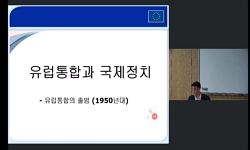Debates around the priorities between the democratisation of educational administration for stable, sustainable education policy, and the decentralisation of educational autonomy, remain preoccupied with on-going issues on the establishment of Korea...
http://chineseinput.net/에서 pinyin(병음)방식으로 중국어를 변환할 수 있습니다.
변환된 중국어를 복사하여 사용하시면 됩니다.
- 中文 을 입력하시려면 zhongwen을 입력하시고 space를누르시면됩니다.
- 北京 을 입력하시려면 beijing을 입력하시고 space를 누르시면 됩니다.
[Working Paper] The Finnish National Agency for Education Since 1990s: Changing Role and Relational Identity
한글로보기https://www.riss.kr/link?id=A108165844
- 저자
- 발행기관
- 학술지명
- 권호사항
-
발행연도
2019
-
작성언어
English
- 주제어
-
자료형태
학술저널
- 발행기관 URL
-
수록면
87-105(19쪽)
- 제공처
-
0
상세조회 -
0
다운로드
부가정보
다국어 초록 (Multilingual Abstract)
Debates around the priorities between the democratisation of educational administration for stable, sustainable education policy, and the decentralisation of educational autonomy, remain preoccupied with on-going issues on the establishment of Korea’s National Board of Education.
The board members of directors under the Finnish National Agency for Education (Opetushallitus) is considered as the participatory corporatist model and characterised by a rational decision-making process. This process leads to the (dis-)continuity and consensus without being influenced by national politics. However, in reality the consensus process is long with sensitive issues being predominantly reflected upon by different board members of education with varying perspectives (johtokunta) based upon their involvement as representatives of political parties, interest groups and social partners (Kuntaliito, OAJ, EK, student unions and so on), and a politically appointed director general (pääjohtaja). Possible tensions may arise between the Ministry of Education and the board members of the Finnish National Agency for Education (which is subordinated by the Ministry of Education and Culture) if not properly facilitated by the role of the director general as middle leadership in the consensus process.
The study aims to unravel the contingent, relational, and complex character of decision-making and implementation process of Finnish national education policy; as well as its relational values of agrarian/social-democratic ‘equality’ and conservative liberal market ‘equity’ with the devolution of local practice since mid-1990s (Scott, D. et al. 2014; Simola, H. et al. 2017). The intertwined dynamics in educational policy making and implementation processes, governance, and national educational strategies are scrutinised by analysing the influence of exogenous, transnational factors alongside the gradual power shift of politicians to technocrat, professionals; and educational customers (or individual learners) as the changing agents. This aligns with the recent structural changes of the National Agency for Education to reflect on regarding Finnish education as a commodity for export.
The Finnish Education Evaluation Center (KARVI) and the University Student Examination Board (Ylioppilastutkintolautakunta) are converged as separate units within the Finnish National Agency for Education. The recent administrative changes of the Finnish National Agency for Education aim to reduce hierarchies and increase interaction both within the agency and with external partners (OPH 2019).
The different roles, duties and relational practices between the main actors are being analysed through in-depth interviews with the educational committee in parliament, officials in the Ministry of Education and Culture, directors and board members of education in the Finnish National Agency for Education, officials in local municipalities, and individual school agents in different regions.
In conclusion, the ontological meaning of Finnish National Agency for Education is unfolded in a process of locating unstable positions and of crossing blurred boundaries between “economic growth/efficiency/capitalism” and “distribution of welfare/equality/ community values”. This is done whilst (co-/re-/de-) formulating individual and collective identity and ethos in response to a different political coalition, social participation, and economic growth on a non-linear time-space context.
목차 (Table of Contents)
- Introduction
- Brief history of the Finnish National Agency for Education
- The role of Opetushallitus
- The National Board of Education has the board (johtokunta): Who will be included and excluded within Korean context?
- Five Years Development Plan
- Introduction
- Brief history of the Finnish National Agency for Education
- The role of Opetushallitus
- The National Board of Education has the board (johtokunta): Who will be included and excluded within Korean context?
- Five Years Development Plan
- The Government Subsidy system to the local municipalities
- The Political Dynamics of Relationship between the Ministry of Education, the Finnish National Agency for Education, and the Schools at Municipalities
- The governing board(johtokunta)
- The director general (pääjohtaja)
- Appointment of Director General and a Governing Board
- Findings
- References
동일학술지(권/호) 다른 논문
-
- 한국교육행정학회
- 편집부(편집자)
- 2019
-
- 한국교육행정학회
- 신정철
- 2019
-
교육행정학자가 잡아야 할 두 마리 토끼: Glocalization & Globalization
- 한국교육행정학회
- 박주호
- 2019
-
- 한국교육행정학회
- 송경오
- 2019




 DBpia
DBpia






